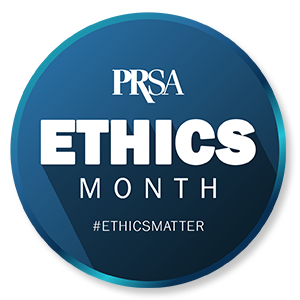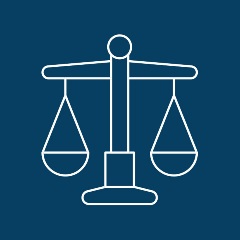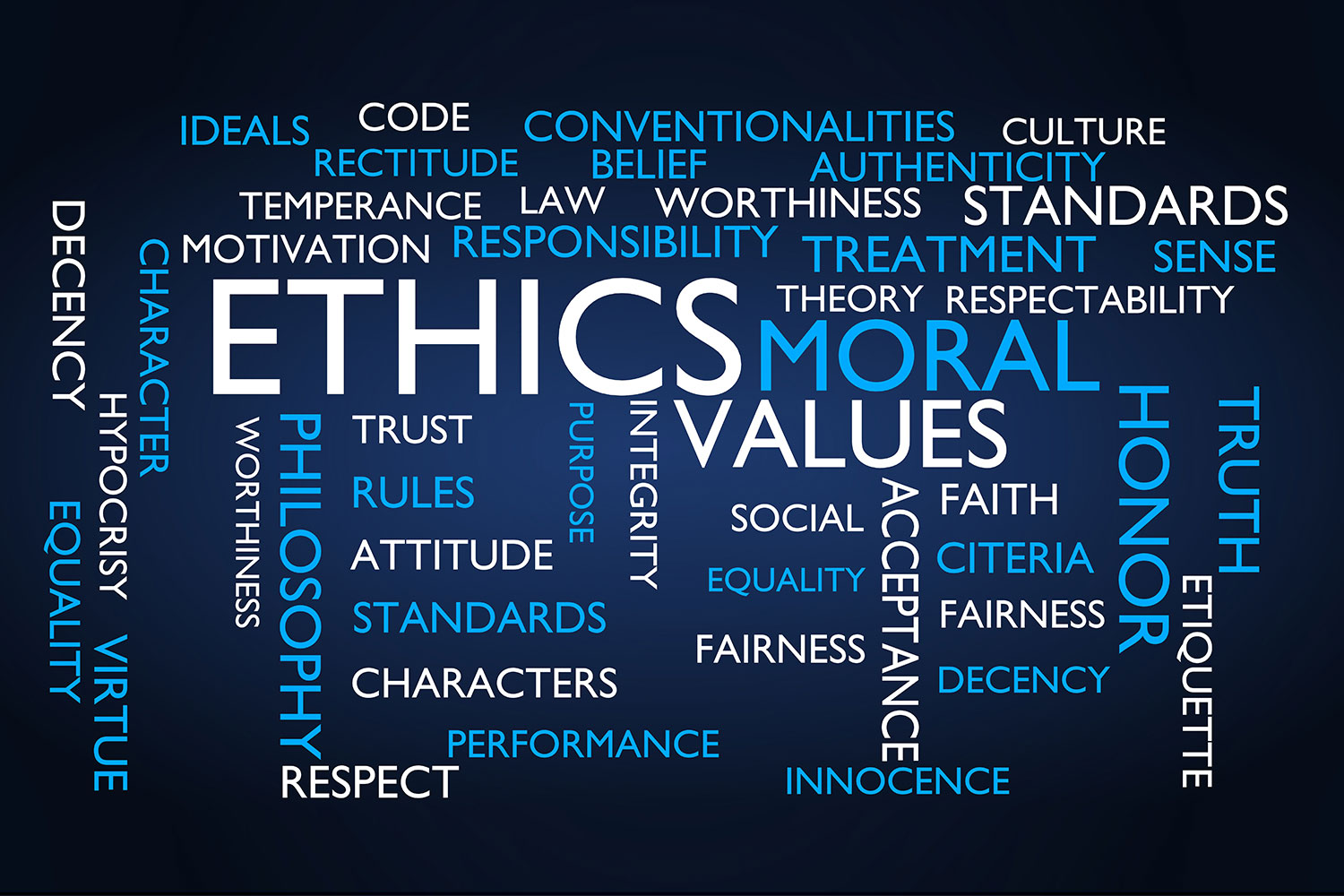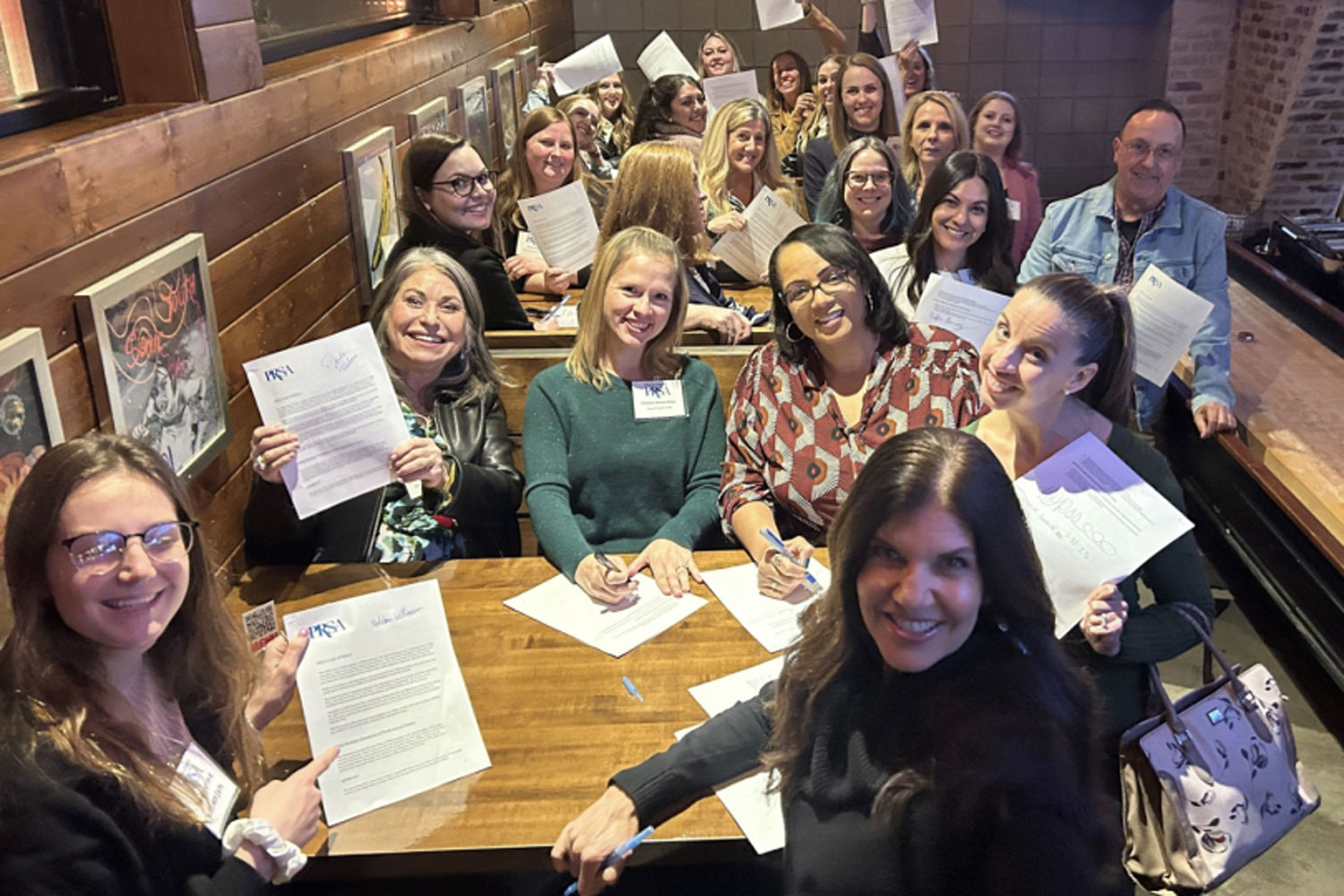Ethics
Ethics for an Evolving Profession
The PRSA Code of Ethics is widely regarded as the cornerstone of the ethical practice of public relations. First developed in 1950, the Code applies to PRSA members and is designed to be a useful guide as they carry out their ethical responsibilities, setting out principles that uphold core values, including advocacy, honesty, expertise, independence, loyalty and fairness.
PRSA provides educational opportunities to explore ethics within public relations year-round, including hosting a variety of offerings during “Ethics Month” in September and at PRSA’s annual conference.
Recognizing and acknowledging ethical issues as they arise is among the reasons the PRSA Board of Ethics and Professional Standards (BEPS) was created. Comprised of senior professionals and PRSA members, BEPS provides an abundance of educational resources and training for public relations professionals that include case studies, position papers, blogs and other assets which follow in this section.
BEPS upholds and amends, when necessary, the PRSA Code of Ethics.
Understanding the PRSA Code of Ethics
Understanding the PRSA Code of Ethics
The PRSA Code of Ethics exists to inspire ethical behavior, clearly identify improper public relations practices and teach members how to avoid them.
As a voluntary organization, PRSA can:
- Establish voluntary practice standards, codes of conduct and practice guidelines.
- Inspire, educate and motivate best practice through a wide variety of educational programs and interactive dialogue with practitioners who inspire others to the highest levels of ethical practice.
- Promote voluntary compliance.
- Establish that ethical practice is the most important obligation of a PRSA member.
- Establish reasonable, sensible and very limited procedures and regulations for becoming a member and removing individuals from membership.
- Establish what is unethical and improper:
- A threat to the ethical practice of public relations;
- Behaviors inappropriate or inconsistent with the Code;
- Behaviors disruptive or that undermine ethical practices;
- Practices and behavior destructive to the reputation of practitioners, our profession or PRSA.
- Teach members how to avoid improper behavior.
As a volunteer organization, PRSA’s enforcement authority is limited.
Organizations that have enforceable regulations, rules and procedures are empowered by higher authorities such as government or quasi- government organizations
who can license or delegate the power to enforce and sanction. Some organizations with enforcement power gain that power from legislation or government executive authority. PRSA has no such legislative or government authorized sanctioning power nor
is it likely to gain or seek such power.
Download the statement of professional values
Ethics Month
Ethics Month

PRSA provides resources and educational opportunities to explore ethics within public relations year-round, including hosting a variety of offerings during “Ethics Month” in September and at PRSA’s annual Conference.
A special message about Ethics Month from Linda Staley, APR, Fellow PRSA, BEPS Chair
PRSA RESOURCES
WEBINARS
LIVE WEBINAR
Navigating Ethical PR in a Post-Truth World
September 10, 2025 4 p.m. – 5 p.m. (Eastern Daylight Time)
Equip yourself with the knowledge and tools needed to protect your clients, your organization and your own professional integrity in an increasingly complex and morally ambiguous world. Reaffirm your commitment to ethical communication and become a beacon
of truth in the post-truth era.
ON-DEMAND
Straight Talk on PR Ethics: Skills, Shortfalls and Smart Counsel
As public relations professionals, we hold a special obligation to operate ethically. For Accredited members (APR or APR+M), maintaining that standard includes renewing Accreditation every three years by earning Continuing Education Units (CEUs)—with
at least one focused on ethics.
ARTICLES
Safeguarding Trust: PRSA Webinar Addresses Ethics in a Post-Truth World
In today’s “post-truth” environment — where misinformation spreads at lightning speed and AI blurs the line between fact and fiction — ethical decision-making has never been more essential for communicators.
Member resources specifically tailored to Ethics Month 2025 can be found in our Ethics in Communication Community on MyPRSA.
You must be logged in to myPRSA to access these resources.
More Ethics related programming can be found in our Resources page.
PRSA Code of Ethics
PRSA Code of Ethics
The PRSA Code of Ethics applies to PRSA members. The Code is designed to be a useful guide for PRSA members as they carry out their ethical responsibilities. This document is designed to anticipate and accommodate, by precedent, ethical challenges that may arise. The scenarios outlined in the Code provision are actual examples of misconduct. More will be added as experience with the Code occurs.
PRSA is committed to ethical practices. The level of public trust PRSA members seek, as we serve the public good, means we have taken on a special obligation to operate ethically.
The value of member reputation depends upon the ethical conduct of everyone affiliated with the PRSA. Each of us sets an example for each other – as well as other professionals – by our pursuit of excellence with powerful standards of performance, professionalism and ethical conduct.
Emphasis on enforcement of the Code has been eliminated. But, the PRSA Board of Directors retains the right to bar from membership or expel from the Society any individual who has been or is sanctioned by a government agency or convicted in a court of law of an action that fails to comply with the Code.
Ethical practice is the most important obligation of a PRSA member. We view the Member Code of Ethics as a model for other professions, organizations and professionals.
PRSA Member Statement of Professional Values
This statement presents the core values of PRSA members and, more broadly, of the public relations profession. These values provide the foundation for the Code of Ethics and set the industry standard for the professional practice of public relations.
These values are the fundamental beliefs that guide our behaviors and decision-making process. We believe our professional values are vital to the integrity of the profession as a whole.

Advocacy
We serve the public interest by acting as responsible advocates for those we represent. We provide a voice in the marketplace of ideas, facts, and viewpoints to aid informed public debate.

Honesty
We adhere to the highest standards of accuracy and truth in advancing the interests of those we represent and in communicating with the public.

Expertise
We acquire and responsibly use specialized knowledge and experience. We advance the profession through continued professional development, research, and education. We build mutual understanding, credibility, and relationships among a wide array of institutions and audiences.

Independence
We provide objective counsel to those we represent. We are accountable for our actions.

Loyalty
We are faithful to those we represent, while honoring our obligation to serve the public interest.

Fairness
We deal fairly with clients, employers, competitors, peers, vendors, the media, and the general public. We respect all opinions and support the right of free expression.
PRSA Code Provisions of Conduct
Free Flow of Information
Core Principle:
Protecting and advancing the free flow of accurate and truthful information is essential to serving the public interest and contributing to informed decision making in a democratic society.
Intent:
- To maintain the integrity of relationships with the media, government officials, and the public.
- To aid informed decision-making.
Guidelines:
A member shall:
- Preserve the integrity of the process of communication.
- Be honest and accurate in all communications.
- Act promptly to correct erroneous communications for which the practitioner is responsible.
- Preserve the free flow of unprejudiced information when giving or receiving gifts by ensuring that gifts are nominal, legal, and infrequent.
Examples of Improper Conduct Under this Provision:
- A member representing a ski manufacturer gives a pair of expensive racing skis to a sports magazine columnist, to influence the columnist to write favorable articles about the product.
- A member entertains a government official beyond legal limits and/or in violation of government reporting requirements.
Competition
Core Principle:
Promoting healthy and fair competition among professionals preserves an ethical climate while fostering a robust business environment.
Intent:
- To promote respect and fair competition among public relations professionals.
- To serve the public interest by providing the widest choice of practitioner options.
Guidelines:
A member shall:
- Follow ethical hiring practices designed to respect free and open competition without deliberately undermining a competitor.
- Preserve intellectual property rights in the marketplace.
Examples of Improper Conduct Under This Provision:
- A member employed by a “client organization” shares helpful information with a counseling firm that is competing with others for the organization’s business.
- A member spreads malicious and unfounded rumors about a competitor in order to alienate the competitor’s clients and employees in a ploy to recruit people and business.
Disclosure of Information
Core Principle:
Open communication fosters informed decision making in a democratic society.
Intent:
To build trust with the public by revealing all information needed for responsible decision making.
Guidelines:
A member shall:
- Be honest and accurate in all communications.
- Act promptly to correct erroneous communications for which the member is responsible.
- Investigate the truthfulness and accuracy of information released on behalf of those represented.
- Reveal the sponsors for causes and interests represented.
- Disclose financial interest (such as stock ownership) in a client’s organization.
- Avoid deceptive practices.
Examples of Improper Conduct Under this Provision:
- Front groups: A member implements “grass roots” campaigns or letter-writing campaigns to legislators on behalf of undisclosed interest groups.
- Lying by omission: A practitioner for a corporation knowingly fails to release financial information, giving a misleading impression of the corporation’s performance.
- A member discovers inaccurate information disseminated via a website or media kit and does not correct the information.
- A member deceives the public by employing people to pose as volunteers to speak at public hearings and participate in “grass roots” campaigns.
Safeguarding Confidences
Core Principle:
Client trust requires appropriate protection of confidential and private information.
Intent:
To protect the privacy rights of clients, organizations, and individuals by safeguarding confidential information.
Guidelines:
- A member shall: Safeguard the confidences and privacy rights of present, former, and prospective clients and employees.
- Protect privileged, confidential, or insider information gained from a client or organization.
- Immediately advise an appropriate authority if a member discovers that confidential information is being divulged by an employee of a client company or organization.
Examples of Improper Conduct Under This Provision:
- A member changes jobs, takes confidential information, and uses that information in the new position to the detriment of the former employer.
- A member intentionally leaks proprietary information to the detriment of some other party.
Conflicts of Interest
Core Principle:
Avoiding real, potential or perceived conflicts of interest builds the trust of clients, employers, and the publics.
Intent:
- To earn trust and mutual respect with clients or employers.
- To build trust with the public by avoiding or ending situations that put one’s personal or professional interests in conflict with society’s interests.
Guidelines:
A member shall:
- Act in the best interests of the client or employer, even subordinating the member’s personal interests.
- Avoid actions and circumstances that may appear to compromise good business judgment or create a conflict between personal and professional interests.
- Disclose promptly any existing or potential conflict of interest to affected clients or organizations.
- Encourage clients and customers to determine if a conflict exists after notifying all affected parties.
Examples of Improper Conduct Under This Provision:
- The member fails to disclose that he or she has a strong financial interest in a client’s chief competitor.
- The member represents a “competitor company” or a “conflicting interest” without informing a prospective client.
Enhancing the Profession
Core Principle:
Public relations professionals work constantly to strengthen the public’s trust in the profession.
Intent:
- To build respect and credibility with the public for the profession of public relations.
- To improve, adapt and expand professional practices.
Guidelines:
A member shall:
- Acknowledge that there is an obligation to protect and enhance the profession.
- Keep informed and educated about practices in the profession to ensure ethical conduct.
- Actively pursue personal professional development.
- Decline representation of clients or organizations that urge or require actions contrary to this Code.
- Accurately define what public relations activities can accomplish.
- Counsel subordinates in proper ethical decision making.
- Require that subordinates adhere to the ethical requirements of the Code.
- Report practices that fail to comply with the Code, whether committed by PRSA members or not, to the appropriate authority.
Examples of Improper Conduct Under This Provision:
- A PRSA member declares publicly that a product the client sells is safe, without disclosing evidence to the contrary.
- A member initially assigns some questionable client work to a non-member practitioner to avoid the ethical obligation of PRSA membership.
Ethical Standards Advisories (ESAs)
Ethical Standards Advisories (ESAs)
All PRSA members pledge adherence to the Code of Ethics. As issues arise relating to the practice of communications, the PRSA Board of Ethics and Professional Standards (BEPS) provides guidance within the framework of the Code. The PRSA Board of Directors
then announces these guidelines through an Ethical Standard Advisory (ESA). ESAs are for informational purposes only and not for the purpose of providing legal advice.
PRSA released its ESA on misinformation in December 2021.
ESA 21 FINAL
A complete list of ESAs are available on MyPRSA for PRSA and PRSSA members.
Not a member?
Join Now
Case Studies
Case Studies
SCENARIOS
DISCUSSION GUIDES
Resources
Resources

PROMISE & PITFALLS:
The Ethical Use of AI
For Public Relations Practitioners
VERSION 2.0
This new edition provides practical, easy-to-apply guidance for communicators using AI responsibly — with updated frameworks for transparency, governance, and accountability.
This guide is available as a free resource for PRSA members.
Non-members can access the guide by completing the form below.
NONMEMBERS
Complete the form to receive a link to The Ethical Use of AI.
Request Download
By submitting your information, you consent to receiving email communications from PRSA and agree to PRSA's Privacy Policy.
Not a PRSA member?
BEPS Position Papers
The PRSA Board of Ethics and Professional Standards
(BEPS)
Recognizing and acknowledging ethical issues as they arise is among the reasons the PRSA Board of Ethics and Professional Standards (BEPS) was created.
Comprised of senior professionals and PRSA members, BEPS provides an abundance of educational resources and training for public relations professionals that include case studies, position papers, blogs and other assets which follow in this section.
BEPS upholds and amends, when necessary, the PRSA Code of Ethics.
For additional information about the Code of Ethics and PRSA’s stance on ethical communications, email the PRSA Board of Ethics and Professional Standards at beps@prsa.org.
"Pay for Play"
As the media landscape continues to evolve, traditional news media organizations have been joined by corporate and institutionally controlled media operations, citizen journalists, bloggers, podcasters, YouTubers and others, all gathering and disseminating information to the masses.
This has blurred the lines between traditional journalistic practice and practices that are not adherent to any professional codes of ethics or conduct. As a result, an increasing number of digital channels and platforms solicit and accept compensation as a quid pro quo condition for coverage and visibility.
In certain instances, particularly in the marketing of goods and services, the Federal Trade Commission (FTC) has instituted guidelines that require certain kinds of content to be labeled as “sponsored content.” In many other cases, communication is unregulated.
When payment is required for the development and publishing (in print or through digital channels) of content, this is known as “pay-for-play.” It involves a transaction where the payor makes undisclosed payments to the media channel to feature specific content, whether that content be blog posts, videos interviews, podcast interviews, print or digital columns or interviews.
Due to the lack of transparency, the practice of pay-for-play can deceive consumers into believing that content was selected based on its own merit and is therefore deserving of third-party credibility. In reality, however, such content has not passed such a test.
Our Position
PRSA’s Board of Ethics and Professional Standards (BEPS) takes the position that “pay-for-play” practices are in conflict with several aspects of PRSA’s Code of Ethics and Code Provisions of Conduct for members.
Consumers of all media have the right to expect advance disclosure about anything that might compromise the integrity of the information they receive. While we recognize that in some cultures, pay-for-play is condoned and expected, BEPS maintains that the standard and aspirational practice of public relations be in line with the position of this paper on pay-for-play.
The PRSA Code of Ethics and Pay-for-Play
More specifically, pay-for-play violates four PRSA Code of Ethics provisions:
- Free Flow of Information – Protect and advance the free flow of accurate and truthful information which is essential to serving the public interest and contributing to informed decision-making in a democratic society.
- Disclosure of Information – Build trust with the public through all communications by revealing all information needed for responsible decision-making.
- Conflicts of Interest – Avoid real, potential or perceived conflicts of interest to build the trust of clients, employers and the publics.
- Enhancing the Profession – Build respect and credibility with the public for the profession of public relations.
PRSA’s Professional Values and Pay-for-Play
Pay-for-play is inconsistent with the following professional values of PRSA:
- Honesty – Adhere to the highest standards of accuracy and truth in advancing the interests of those we represent and in communicating with the public.
- Fairness – Deal fairly with clients, employers, competitors, peers, vendors, the media and the general public.
- Independence – Provide objective counsel to those we represent. We are accountable for our actions.
How to Avoid Pay-for-Play
BEPS recommends that:
- Disclosure be requested and included with the final information product in any situation where compensation was provided in return for exposure.
- Where it is common practice to offer journalists, bloggers, digital channel operators free or special travel, lodging, gifts or non-monetary compensation, we recommend that PRSA members encourage the recipients to disclose those items of material value.
- PRSA members always act to encourage the clear and obvious disclosure of crucial information that consumers should have, or reasonably expect to have.
*Based on a previously developed Ethics Standards Advisory (ESA).
Ethics & Social Media
Because all major social media platforms are accessible to billions around the world, regardless of professional training or background, they are largely unmonitored and unregulated through the prism of ethics. More to the point, unless content violates the specific rules of individual social platforms and is policed by the platforms’ own personnel, it is left to stand.
The speed, frequency and accessibility of these platforms have created new challenges for public relations professionals, intensifying the level of professional ethical responsibility for organizations, brands, agencies and clients.
These dynamics make it more incumbent on public relations practitioners to set themselves and their organizations apart through unquestioned credibility and ethical standards, ultimately building and maintaining strong reputations for the organizations those practitioners represent.
Further, the professional public practitioner must be aware that social media activity cannot be viewed in a vacuum, and that the interdependency that now exists between news organizations and social media must be considered in all communications.
Our Position
PRSA’s Board of Ethics and Professional Standards (BEPS) takes the position that public relations practitioners must not accept on face value certain common practices in the public’s use of social media, but rather, incorporate a higher standard of practice by adhering to the PRSA Code of Ethics in all applications of social media strategies, tactics and utilization.
The PRSA Code of Ethics and Social Media
Four PRSA Code of Ethics provisions address professionals’ use of social media:
- Disclosure of Information – Build trust with the public through all communications by revealing all information needed for responsible decision-making.
- Content providers should fully disclose paid placements and all associations with a product to support informed opinions and rational decision-making.
- Safeguarding Confidences: Client trust requires appropriate protection of confidential and private information, especially as it pertains to social media.
- Content providers must be aware that, while social media provides an increased ability to reach and engage various publics, it also increases the risk that confidential information, whether personal, corporate or intellectual property, be improperly disclosed via social media channels.
- Improper sharing of information, even without intent, can have serious consequences for practitioners, clients, employees, employers and others.
- Content providers must be cognizant of an employee’s right to free speech as defined by the National Labor Relations Board (NLRB).
- Conflicts of Interest – Avoid real, potential or perceived conflicts of interest to build the trust of clients, employers and the publics.
- While creating content and taking part in online conversations are effective tactics for branding individuals as subject matter experts, public relations professionals must disclose conflicts of interest when communicating with audiences.
- If working with social media influencers and providing product samples, require proper disclosures (per FTC guidelines) are made. If gifts are given, ensure they are nominal, legal and infrequent.
- Enhancing the Profession – Build respect and credibility with the public for the profession of public relations.
- Social media should keep publics informed and educated about the issues surrounding the profession, share best practices and case studies.
PRSA’s Professional Values and Social Media
The following professional values of PRSA come into play in social media applications:
- Honesty – Adhere to the highest standards of accuracy and truth in advancing the interests of those we represent and in communicating with the public.
- Fairness – Deal fairly with clients, employers, competitors, peers, vendors, the media and the general public.
- Advocacy – Serve the public interest by acting as responsible advocates for our clients and organizations. We best support the marketplace of ideas, facts and viewpoints, and aid informed public debate and stakeholder decision-making when authors or sponsors are fully disclosed and transparent.
An Ethical Approach to Social Media
BEPS recommends that public relations professionals understand that trust is the ultimate currency of social media. In order to enhance trust, build positive relationships, and support a free and informed democratic society, the specific portions of the PRSA Code of Ethics as cited here are clearly understood and embraced in the use of all digital and social media.
*Based on a previously developed Ethics Standards Advisory (ESA).
Plagiarism
Technology makes it very easy to intentionally or inadvertently engage in the practice of plagiarism, which is the unauthorized use or close imitation of the language and thoughts of another content creator and the representation of that content as
your own original work.
For this reason, public relations practitioners must be fully aware of the ethical standards surrounding the need to attribute, and as appropriate, pay licensing compensation for the use of others’ content and work in their own content creation.
Plagiarism can be treated as fraud or theft of intellectual property. And while it is not the same as copyright infringement, both are violations of someone else’s intellectual property rights.
While copyright infringement involves the misrepresentation of someone else’s words or images without approval or compensation, plagiarism centers on falsely representing another’s ideas or words as your own. You can be guilty of plagiarism even when copyright permission has been granted or waived, or if the material was not copyrighted in the first place. Much original content is in the public domain and cannot be copyrighted, but for anyone to copy this original content and claim it as their own is plagiarism.
Our Position
PRSA’s Board of Ethics and Professional Standards (BEPS) takes the position that even inadvertent violation of plagiarism standards carries equal weight to the intentional misrepresentation of another’s words and ideas as your own. With
this in mind, it is the full responsibility of the public relations practitioner to understand and respect the intellectual property rights of others, along with PRSA’s ethical standards surrounding plagiarism.
Professional public relations practitioners must accept the notion that content is privately owned by the creator. While common terms such as “open sourcing” or “Fair Use” are used to justify the use of others’ original content, in full or in part, proper attributions and permissions are critical in establishing credible, accurate and original content of your own.
The PRSA Code of Ethics and Plagiarism
More specifically, four PRSA Code of Ethics provisions come into play:
Free Flow of Information – Protecting and advancing the free flow of accurate and truthful information which is essential to serving the public interest and contributing to informed decision-making in a democratic society.
- Competition – Promote healthy and fair competition among profession while fostering a robust business environment by preserving intellectual property rights in the marketplace.
- Disclosure of Information – Build trust with the public through all communications by revealing all information needed for responsible decision-making.
- Conflicts of Interest – Avoid real, potential or perceived conflicts of interest to build the trust of clients, employers and the publics.
PRSA’s Professional Values and Plagiarism
Plagiarism is inconsistent with the following professional values of PRSA:
- Honesty – Adhere to the highest standards of accuracy and truth in advancing the interests of those we represent and in communicating with the public.
- Expertise – Acquire and responsibly use specialized knowledge and experience, advancing the profession through continued professional development, research and education. Build mutual understanding, credibility and relationships among the full range of institutions and audiences.
- Fairness – Deal fairly with clients, employers, competitors, peers, vendors, the media and the general public.
How to Avoid Plagiarizing Others’ Work
BEPS recommends that:
- In working with reference materials, do not copy content, a sentence, paragraph document or anything from another source even if you edit the material to fit your own needs and present the content as your own work.
- Use your own words and ideas, and paraphrase, as opposed to copying other content directly.
- When paraphrasing another’s content, give proper credit to the original creator.
- Use quotation marks and credit the source or author when you copy/reference exact wording.
- When using any source form the Internet, including content from websites, emails and newsletters, among other sources, know that someone else created that content and is entitled to proper credit and attribution.
- Disclose all sources for your work product.
*Based on a previously developed Ethics Standards Advisory (ESA).
Paid Spokepersons and Influencers
The practice of paying others to represent organizations and brands is now so common that millions of consumers of pop culture are broadly aware of the terms, “influencer” or “paid influencer.” These consumers are aware of the varied levels of financial success individual influencers have achieved, and for some people, influencers are aspirational role models for their own dreams and goals. Many influencers did not have celebrity status before becoming celebrities in their own right by attracting large followings through social media and the Internet.
Still, other influencers and paid spokespersons may have gained celebrity status through success in the entertainment, sports, business or other industries.
Further, some journalists, broadcasters or former journalists have built their own “personal brands” that have led to their trading on those brands through paid endorsement arrangements. It is not uncommon for these individuals to participate in media interviews offering expert opinion, commentary or information related to the companies, organizations or interests they represent.
Companies, organizations and brands have found that paid spokespersons and influencers are highly effective messengers as part of comprehensive marketing and communications programs.
Because the platforms for communication are many and diverse, there are numerous opportunities to create the perception that these spokespersons and influencers are not compensated for their endorsements and related activity.
Our Position
PRSA’s Board of Ethics and Professional Standards (BEPS) takes the position that anyone who is paid to serve as a spokesperson, advocate or influencer for an organization, company, brand or special interest, must disclose the contractual arrangement in place or the relationship between the spokesperson and the interest that is providing the compensation.
The PRSA Code of Ethics and Paid Spokespersons and Influencers
More specifically, three PRSA Code of Ethics provisions come into play:
- Disclosure of Information – Build trust with the public through all communications by revealing all information needed for responsible decision-making.
- Conflicts of Interest – Avoid real, potential or perceived conflicts of interest to build the trust of clients, employers and the publics. Act in the best interest of the client or employer. Avoid actions or circumstances that may appear to compromise good business judgement or create a conflict between personal and professional interests. Disclose promptly any existing or potential conflict of interest to affected clients or organizations.
- Enhancing the Profession – Work to strengthen the public’s trust in the profession, acknowledging that there is an obligation to protect and enhance the profession.
PRSA’s Professional Values and Paid Spokespersons and Influencers
The following professional values of PRSA come into play:
- Advocacy – Serve the public interest by acting as responsible advocates for those we represent. Provide a voice in the marketplace of ideas, facts and viewpoints to aid informed public debate.
- Independence – Provide objective counsel.
- Honesty – Adhere to the highest standards of accuracy and truth in advancing the interests of those we represent and in communicating with the public.
- Fairness – Deal fairly with clients, employers, competitors, peers, vendors, the media and the general public. Respect all opinions and support the right of free expression.
How to Maintain Ethical Standards in Utilizing Paid Spokespersons and Influencers
BEPS recommends that:
- Commercial relationships must be disclosed in advance of or simultaneous to the same public forum to ensure that those affected or potentially influenced can make informed, knowledgeable decisions.
- Every party involved in the contractual relationship has an obligation to disclose the relationship. Failure to disclose is improper conduct under the PRSA Code of Ethics.
- Be honest and accurate in all communications, revealing the sponsors for causes, programs and interests that are represented and any financial interest they or their clients may have in the outcome of events or individual decisions.
*Based on a previously developed Ethics Standards Advisory (ESA).
Representing Front Groups
A “front group” is an organization that is created or labeled in such a way as to mislead the public and others as to its true mission. Front groups are most often created as part of larger strategies to create deception by hiding true intent.
While the rationale behind the creation of front groups can vary from one organization to the next, the common assumption is that the unpopular nature of the actual mission of the organization is such a liability for communication that deceptive practices are required to establish credibility and gain the trust of unsuspecting publics.
Our Position
PRSA’s Board of Ethics and Professional Standards (BEPS) takes the position that any effort to deceive the public or others is a clear violation of the PRSA Code of Ethics and other common ethical standards. Professional public relations practitioners are required to act in the public interest, which means members are charged to uphold the principle that open communication and transparency are essential for informed decision-making in a democratic society.
The PRSA Code of Ethics and Front Groups
More specifically, four PRSA Code of Ethics Provisions come into play:
- Free Flow of Information – Protecting and advancing the free flow of accurate and truthful information which is essential to serving the public interest and contributing to informed decision-making in a democratic society.
- Disclosure of Information – Build trust with the public through all communications by revealing all information needed for responsible decision-making.
- Conflicts of Interest – Avoid real, potential or perceived conflicts of interest to build the trust of clients, employers and the publics. Act in the best interest of the client or employer. Avoid actions or circumstances that may appear to compromise good business judgement or create a conflict between personal and professional interests. Disclose promptly any existing or potential conflict of interest to affected clients or organizations.
- Enhancing the Profession – Work to strengthen the public’s trust in the profession, acknowledging that there is an obligation to protect and enhance the profession.
PRSA’s Professional Values and Front Groups
The following professional values of PRSA come into play:
- Honesty – Adhere to the highest standards of accuracy and truth in advancing the interests of those we represent and in communicating with the public.
- Fairness – Deal fairly with clients, employers, competitors, peers, vendors, the media and the general public. Respect all opinions and support the right of free expression.
- Advocacy – Serve the public interest by acting as responsible advocates for those we represent. Provide a voice in the marketplace of ideas, facts and viewpoints to aid informed public debate.
How to Maintain Ethical Standards on the Matter of Front Groups
BEPS recommends that PRSA members recognize that assisting front groups and individuals that represent undisclosed sponsorships and/or deceptive or misleading descriptions of goals, causes, tactics, sponsors or participants, even if such activities are lawful, constitutes improper conduct and should be avoided.
*Based on a previously developed Ethics Standards Advisory (ESA).
Overstating Fees or Compensation
While the practice of overstating charges, fees and/or compensation can happen in any business and industry, and public relations professionals within those organizations can find themselves aware of this activity, the primary focus of this paper relates to when public relations consultants engage in these practices.
When a business or organization claims compensation or credit for work that was never performed and is compensated on that basis by a customer or a client, the entire profession of public relations can be harmed.
While such practices may indeed be in violation of contractual obligations and can be found to be illegal, they are at the very least unethical and can weaken the public’s trust in the public relations profession as a whole, and individual practitioners,
specifically.
Our Position
PRSA’s Board of Ethics and Professional Standards (BEPS) takes the position that members who provide public relations services to paying clients charge clients only for services rendered and in accordance with all existing contracts and related obligations. This includes the proper reporting of services rendered, time spent rendering those services as agreed upon, out of pocket charges and other related fees. Any attempt to inflate or overstate charges or fees and related support data is a violation of the PRSA Code of Ethics.
The PRSA Code of Ethics and the Overstatement of Fees or Compensation
More specifically, one PRSA Code of Ethics provision is primary:
- Enhancing the Profession – Work to strengthen the public’s trust in the profession, acknowledging that there is an obligation to protect and enhance the profession.
PRSA’s Professional Values and the Overstatement of Fees or Compensation
The following professional values of PRSA come into play:
- Honesty – Adhere to the highest standards of accuracy and truth in advancing the interests of those we represent and in communicating with the public.
- Fairness – Deal fairly with clients, employers, competitors, peers, vendors, the media and the general public. Respect all opinions and support the right of free expression.
- Loyalty – Be faithful to those we represent, while honoring our obligation to serve the public interest.
How to Address Issues of Overstatement of Fees or Compensation
BEPS recommends that PRSA members pledge to adhere to a rigid code of conduct and the highest standards of professional integrity and responsibility. This means that members and the companies they represent, including agencies, consultancies and other organizations, bill clients and others only for services they perform and expenses they incur on behalf of clients in accordance with all existing contracts.
*Based on a previously developed Ethics Standards Advisory (ESA).
Native Advertising & Sponsored Content
Whether the media platform is digital or traditional, the lines between organic content and advertising and promotional messaging continue to blur as platform owners charge fees for a presence on those platforms. Quite often, that presence mimics
unpaid organic content to the extent that visitors, readers, listeners and viewers cannot distinguish between what is sponsored content and that which is organic.
While the U.S. Federal Trade Commission has established certain rules and guidelines with regard to sponsored content in the context of the sale of goods and services, much of sponsored content goes unregulated. At the same time, an increasing number of media outlets, bloggers, podcasters, video creators and others do not make an effort to distinguish between the transactional nature of paid versus unpaid content.
The practice is not new. Since the 1940s, “advertorials” were carried in numerous print media. Digital and new platforms have expanded the practice of transactional editorial content in the form of native advertising.
Our Position
PRSA’s Board of Ethics and Professional Standards (BEPS) takes the position that it is critical that a clear distinction between organic content and sponsored content be made apparent to the consumer. The sponsor of the content should be clearly identified.
The PRSA Code of Ethics and Native Advertising & Sponsored Content
More specifically, five PRSA Code of Ethics provisions come into play:
- Disclosure of Information – Build trust with the public through all communications by revealing all information needed for responsible decision-making.
- Free Flow of Information – Protecting and advancing the free flow of accurate and truthful information which is essential to serving the public interest and contributing to informed decision-making in a democratic society.
- Competition – Foster healthy and fair competition for a share of voice in the evolving media environment.
- Conflicts of Interest – Avoid real, potential or perceived conflicts of interest to build the trust of clients, employers and the publics. Act in the best interest of the client or employer. Avoid actions or circumstances that may appear to compromise good business judgement or create a conflict between personal and professional interests. Disclose promptly any existing or potential conflict of interest to affected clients or organizations.
- Enhancing the Profession – Work to strengthen the public’s trust in the profession, acknowledging that there is an obligation to protect and enhance the profession.
PRSA’s Professional Values and Native Advertising & Sponsored Content
The following professional values of PRSA come into play:
- Honesty – Adhere to the highest standards of accuracy and truth in advancing the interests of those we represent and in communicating with the public.
- Advocacy – Serve the public interest by acting as responsible advocates for organizations. Support the marketplace of ideas, facts, and viewpoints and aid informed public debate and stakeholder decision-making when sponsors are fully disclosed and transparent.
- Fairness – Deal fairly with clients, employers, competitors, peers, vendors, the media and the general public. Respect all opinions and support the right of free expression.
How to Address Native Advertising & Sponsored Content
BEPS recommends that:
- Public relations professionals work to ensure that sponsorship of content is fully disclosed within the context of that content and made consistently clear to consumers.
- Disclosures should be clear and appropriate to the medium. Sponsored content and advertising should be easily discernable from organic content and must not attempt to deceive the consumer into believing the content comes from an independent or objective point of view.
- When disclosures of sponsored content are made, they should be easily identified and recognized, and should serve to effectively differentiate paid content from organic content.
*Based on a previously developed Ethics Standards Advisory (ESA).
AI and Leadership Accountabilities
As machine learning and artificial intelligence (AI) become more integrated in the daily operation of organizations of all sizes and from all sectors, a wide range of potentially significant ethical issues and challenges present themselves. For example,
one of those challenges – determining the proper way to assign accountability for decisions made by machines or the impact of those decisions and what must be done to address errant decisions – presents certain ethical ramifications.
Until now, human accountability has been the cornerstone of ethical decision-making and oversight. When a decision leads to a negative outcome, it is human nature to identify and hold responsible the humans with oversight responsibility to address the issue, to find resolution, and to work to ensure the negative consequence does not repeat itself.
Simply, we count on people to do the right thing. We trust that humans are motivated to do the right thing on the basis that they are either conditioned to want to do the right thing, or that they have an innate desire for self-preservation and do not want to face negative consequences for their decisions. It is assumed that a human decision-maker wants to physically survive a given situation, wants job security, fears the impact of negative perception, or fears being criminally prosecuted or civilly sued for certain decisions.
In human history, the enforcement of laws, rules, and common ethical standards is centered on the notion of holding the responsible parties to account.
This long-standing dynamic has the potential to change with the arrival and growth of machine learning. In many cases, AI and machine learning remove these variables since machines increasingly make decisions that once were considered the domain of human
beings. Many of these decisions bring ethical considerations with them, and yet if the machine makes a mistake, the people who created the algorithms guiding decision-making may be difficult to identify or may now be far removed from the organizations
involved.
Who is held responsible for the mistake? How should accountabilities be addressed? What steps should be taken to avoid a repeat of the mistake? And who is responsible for getting to the source of the problem and correcting it?
Our Position
PRSA’s Board of Ethics and Professional Standards (BEPS) takes the position that when machines make bad decisions, the public and other stakeholders will look to hold organizations accountable and the people in charge of those organizations. The organizations and people they will look to will be those with oversight responsibility at the time the errant decision is made.
Since the dawn of the industrial age, it has been possible to blame mechanical error for damaging failures. Yet, the common assumption has consistently been that it is not acceptable to assign accountabilities to a machine. Some human being designed the machine, built and programmed the machine, maintained the machine and was responsible for its sound operation. Going forward, it will not be satisfactory to blame machines for the decisions they make and stop there. Accountability should rest with the human beings with oversight responsibilities at time of the mistake. The purpose of assigning accountability may not be to blame those in charge for a root cause, but rather, with the expectation that leadership charged with oversight will take responsibility for, at a minimum, identifying root causes and corrective actions, and perhaps taking those actions. And to do so with proper transparency. This ensures that current management and leadership are working at all times in the interest of the common good. This helps to ensure that AI systems continue to operate with ethical considerations a priority.
The PRSA Code of Ethics and Machine Learning Accountabilities
Four PRSA Code of Ethics Provisions come into play:
- Disclosure of Information – Build trust with the public through all communications by revealing all information needed for responsible decision-making.
- Free Flow of Information – Protecting and advancing the free flow of accurate and truthful information which is essential to serving the public interest and contributing to informed decision-making in a democratic society.
- Conflicts of Interest – Avoid real, potential or perceived conflicts of interest to build the trust of clients, employers and the publics. Act in the best interest of the client or employer. Avoid actions or circumstances that may appear to compromise good business judgement or create a conflict between personal and professional interests.
- Enhancing the Profession – Work to strengthen the public’s trust in the profession, acknowledging that there is an obligation to protect and enhance the profession
PRSA’s Professional Values and Machine Learning Accountabilities
The following professional values of PRSA come into play:
- Honesty – Adhere to the highest standards of accuracy and truth in advancing the interests of those we represent and in communicating with the public.
- Advocacy – Serve the public interest by acting as responsible advocates for organizations. Support the marketplace of ideas, facts, and viewpoints and aid informed public debate and stakeholder decision-making when information sponsors are fully disclosed and transparent.
- Fairness – Deal fairly with clients, employers, competitors, peers, vendors, the media and the general public. Respect all opinions and support the right of free expression.
How to Address AI and Leadership Accountabilities
BEPS recommends that:
- Public relations professionals provide counsel to senior leadership on the basis that AI or machine learning processes cannot be held accountable for the decisions they make, and ultimately, human beings charged with active oversight of operations at that time hold ownership of the situation and actions that must be taken.
- When developing communications programs, content and responses to situations involving AI decision-making, clear lines of human responsibility should be drawn and presented forthrightly.
Social Media as a Reflection of Majority Opinion
Numerous research studies and data organizations continue to remind us that, in spite of, the vast growth of social media, its usage is driven by a minority of a social media platform’s most active users. More to the point, a majority of Americans do not have certain social media accounts and, among those who do, only a small percentage post on an active basis.
For example, the Pew Research Center found in 2019 that approximately 22 percent of Americans use Twitter, and the 10 percent of users who are most active on the platform account for 80% of all tweets from U.S. users. Accordingly, a small fraction of Americans is driving the majority of Twitter’s daily conversations.
At the same time, it is common for news organizations, communications teams and others to presume that Twitter and other social media platforms provide an accurate and reliable snapshot of public opinion.
Our Position
PRSA’s Board of Ethics and Professional Standards (BEPS) takes the position that social media activity is not a scientifically vetted indicator of majority public opinion. While social media activity could provide some insights into certain public opinion, it may not always be representative of the majority. When sharing, discussing or communicating analysis and conclusions based on social media activity, communicators should remind their audiences that the social media platform used as a source is an informal one, no different than nonscientific evidence, and may not be an accurate or reliable representation of majority public sentiment.
The PRSA Code and Social Media as a Reflection of Majority Opinion
More specifically, three PRSA Code of Ethics Provisions come into play:
- Free Flow of Information – Protecting and advancing the free flow of accurate and truthful information which is essential to serving the public interest and contributing to informed decision-making in a democratic society.
- Disclosure of Information – Build trust with the public through all communications by revealing all information needed for responsible decision-making.
- Enhancing the Profession – Work to strengthen the public’s trust in the profession, acknowledging that there is an obligation to protect and enhance the profession.
PRSA’s Professional Values and Social Media as a Reflection of Majority Opinion
The following professional values of PRSA come into play:
- Honesty – Adhere to the highest standards of accuracy and truth in advancing the interests of those we represent and in communicating with the public.
- Fairness – Deal fairly with clients, employers, competitors, peers, vendors, the media and the general public. Respect all opinions and support the right of free expression.
- Advocacy – Serve the public interest by acting as responsible advocates for those we represent. Provide a voice in the marketplace of ideas, facts and viewpoints to aid informed public debate.
- Independence – Provide objective counsel.
How to Address Social Media Activity in the Context of Majority Opinion
BEPS recommends that PRSA members consume all social media content with the understanding that the opinions raised, even if they are “trending” or viral, may not be an accurate representation of majority opinion at any given time.
Communicators should present any information, commentary or analysis of social media content in the context that the social media platform used as the source may not reflect general public sentiment. That the social media content may not be a reliable representation of majority public opinion.
Information Leaks
Public relations professionals are routinely entrusted with confidential and proprietary information. At times, this information may be scheduled for release to internal and external audiences. In some cases, there are no plans to release the information. Other times, in the course of their professional duties, communications professionals are witnesses to conversations, matters or activities that are considered private and not meant for public disclosure.
To protect the confidentiality of some information, public relations professionals may be required to sign non-disclosure agreements (NDAs) or commit to respect the need for confidentiality as part of a business contract or terms of employment. Further, regulatory bodies may also govern the disclosure of information, such as the manner in which the Securities and Exchange Commission (SEC) oversees and enforces rules governing material disclosures from publicly traded companies.
Public relations professionals in government may also be subject to certain rules and terms of employment that govern the disclosure of information, be it formal material or informal anecdotes that may be gleaned on the job.
Against this background, it is common for journalists to receive leaks from inside sources at companies, in government or in other organizations. A “leak” is considered an unauthorized disclosure of information by an individual or group of individuals understood to be acting on their own without the approval or the authority of the organizations involved.
Our Position
PRSA’s Board of Ethics and Professional Standards (BEPS) takes the position that members should refrain from leaking information to the media or any internal or external stakeholder without the expressed approval of organizational leadership. While the act of leaking may ingratiate a public relations representative to a specific reporter or media outlet in the short term, over the long term, the practice of leaking information undermines the profession and degrades the necessary trust that must exist between public relations professionals and their organizations’ senior leadership. Further, there are many cases where the act of leaking is illegal and can carry with it serious criminal or civil penalties.
The PRSA Code and Information Leaks
More specifically, five PRSA Code of Ethics Provisions come into play:
- Safeguarding Confidence – Protect the privacy rights of clients, organizations, and individuals by safeguarding confidential information.
- Disclosure of Information – Build trust with the public through all communications by revealing all information needed for responsible decision-making.
- Free Flow of Information – Protect and advance the free flow of accurate and truthful information to serve the public interest and contribute to informed decision-making.
- Conflicts of Interest – Avoid real, potential or perceived conflicts of interest to build the trust of clients, employers and the publics. Act in the best interest of the client or employer. Avoid actions or circumstances that may appear to compromise good business judgement or create a conflict between personal and professional interests. Disclose promptly any existing or potential conflict of interest to affected clients or organizations.
- Enhancing the Profession – Work to strengthen the public’s trust in the profession, acknowledging that there is an obligation to protect and enhance the profession.
PRSA’s Professional Values and the Leaking of Information
The following professional values of PRSA come into play:
- Loyalty – Remain faithful to those we represent, while honoring our obligation to serve the public interest.
- Honesty – Adhere to the highest standards of accuracy and truth in advancing the interests of those we represent and in communicating with the public.
- Fairness – Deal fairly with clients, employers, competitors, peers, vendors, the media and the general public. Respect all opinions and support the right of free expression.
- Advocacy – Serve the public interest by acting as responsible advocates for those we represent. Provide a voice in the marketplace of ideas, facts and viewpoints to aid informed public debate.
How to Adhere to the Code of Ethics with Regard to Leaking Information
BEPS recommends that members:
- Be fully aware of all laws, regulations, standing contracts and business terms that govern the flow of information within and on behalf of the organizations they both represent and with whom they interact.
- Adhere to all contractual and legal obligations to protect confidentiality.
- Never act autonomously by sharing information, observations, anecdotes or other information that was obtained in confidence as part of a trusted business relationship.
- Follow all standing procedures for approving the disclosure of information to both internal and external publics.
*Based on a previously developed Ethics Standards Advisory (ESA).



















